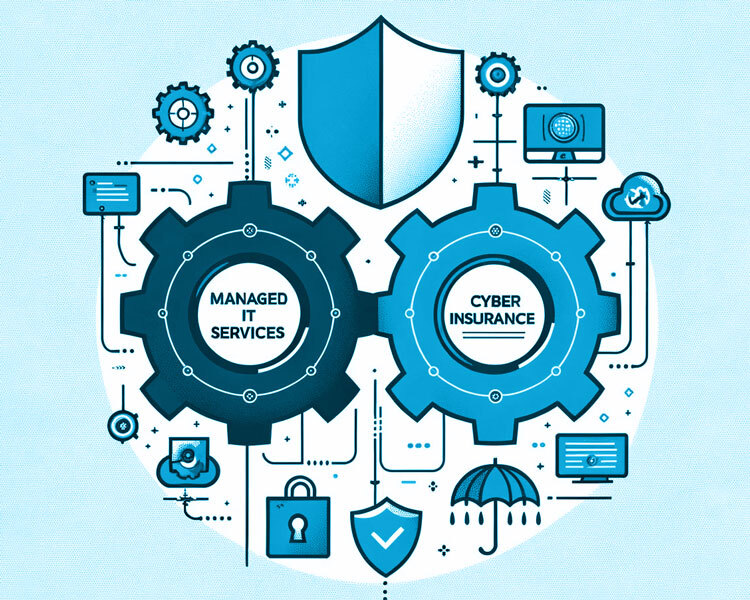What Is Cyber Insurance and Why Do Businesses Need It?
How Cyber Insurance Can Help Protect Your Business
Today, we live in a world where opportunities are limitless—but so are the risks. In this era of endless connectivity, one truth is glaringly apparent: cyber threats are not just possible; they’re inevitable. It’s no longer a question of if your business will face a cyber incident but when. And when that time comes, the impact can be significant. From data breaches to ransomware attacks, businesses need to stay one step ahead.
Enter cyber insurance—a beacon of hope in the murky waters of cybersecurity incidents. Think of it as your digital life jacket, designed to keep your business afloat during and after a cyberattack. But here’s the kicker: while cyber insurance offers a layer of financial protection, pairing it with the expertise of a managed service provider (MSP) like FullScope IT catapults your defense to the next level. It’s not just about recovering from an incident; it’s about preventing them in the first place.
This guide from FullScope IT can help you navigate the cyber insurance landscape with confidence. From understanding why cyber insurance is an indispensable tool for your business to exploring how a partnership with FullScope IT can enhance your cybersecurity posture, we’ve got you covered. We’ll also delve into the benefits of cyber insurance, how it complements your overall risk management strategy, and why it’s crucial in today’s digital world.
What Is Cyber Insurance?
You wouldn’t drive without car insurance, right? Similarly, operating online without cyber insurance is a risk no modern business should take. It’s like having a safety net for your computer systems and digital operations.
Cyber Insurance Policy and Coverage
Cyber insurance policies are designed to protect businesses from the financial impacts of cyber incidents. Coverage for a liability policy can include everything from data breaches to cyber extortion demands, ensuring that your business can recover without crippling financial losses.
First-Party vs. Third-Party Coverage
There are two main types of cyber insurance coverage: first-party and third-party.
- First-Party Coverage: This type of insurance is all about direct damages. Think about the costs for notifying customers about a data breach, recovering lost data, and even dealing with ransomware demands.
- Third-Party Coverage: This type of insurance steps in when legal issues come into play. If someone sues your business over a breach that exposed their data third-party coverage helps with the legal fees and settlements.
Both types of liability coverage are important, offering a shield against the diverse threats lurking in the digital world. With cyber risks on the rise, understanding these coverages can help you choose the right protection for your business, ensuring you’re prepared for whatever comes your way.
Why Businesses Need Cyber Insurance
Think of cyber threats as the common cold of the digital age—they’re everywhere, and nobody’s immune. But instead of a week in bed, you’re looking at stolen sensitive information and a whole lot of mess. With hackers getting smarter by the day, having cyber insurance is like having a good doctor on call. It’s your first line of defense when things go south.
Financial Risks
Imagine cybercrime costs skyrocketing to $23.84 trillion by 2027. Sounds like a lot? It is. And without cyber insurance, those numbers could spell disaster for your business’s finances. Cyber insurance helps keep the scary costs of a security breach in check.
Operational Risks
When cyber trouble hits, it’s not just about the money lost to hackers. Your business could grind to a halt. That’s downtime you can’t afford. Cyber insurance helps cover the lost cash when your digital doors are closed.
Reputational Risks
Nowadays, having cyber insurance also means showing your customers you’re serious about keeping customer information safe. If you don’t, it’s like telling the world you didn’t lock the front door. Not a good look, right?
What Cyber Insurance Covers
Cybersecurity insurance isn’t just one-size-fits-all. It’s got you covered across the board:
- Forensic Investigations: Pays for figuring out how the hackers got in and what they took.
- Litigation Expenses: Covers legal fees if you have to defend yourself because of a breach.
- Regulatory Defense Expenses: Helps with the costs if regulators come knocking with fines.
- Crisis Management Expenses: Takes care of managing the fallout and keeping your reputation intact.
- Business Interruption: Compensates for the money lost while your business is bouncing back.
- Cyber Extortion: Covers costs if you’re facing demands from digital kidnappers.
- Betterment: Sometimes, it’ll even help pay for beefing up your security after an attack.
Cyber insurance is basically your business’s digital guardian angel. It’s there to protect your money, keep things running smoothly, and make sure your reputation stays shiny. In a world full of digital dangers, it’s the backup you can’t afford to go without.
Benefits of Cyber Insurance
Whether it’s a data breach that steals credit card numbers, a ransomware attack that locks critical data or a malware infection that disrupts operations, cyber insurance helps cover the costs.
Financial Protection
Cybercrime is like the wild west out there, with ransomware and malware waiting to pounce. And the damage? It’s not cheap. With the global average cost of a data breach hitting a whopping $4.45 million in 2023, up 15% in just three years, that safety net doesn’t seem like such a bad idea.
Imagine dealing with legal battles, bad press, and worried customers all at once. Cyber insurance covers those legal fees, public relations nightmares, and even the cost of keeping affected customers in the loop with credit monitoring. It’s like having an all-access pass to peace of mind.
More Than Just Money
Cyber insurance isn’t just an expense; it’s an investment in your business’s future. Although cyber insurance costs can be high, it’s important to recognize that it’s about financial protection and having the resources, support, and expert advice to tackle whatever the digital world throws your way. It’s a smart move for any business looking to thrive in the digital age.
- On-Call Support: When cyber trouble hits, time is of the essence. Having cyber insurance means you get support right when you need it, helping you respond and get back on your feet faster than you can say “cyberattack.”
- Access to Cybersecurity Experts: Access to top-notch cybersecurity experts is part of the deal. These are the folks who can dive into the digital mess and pull you out, stat.
- Incentives for Better Hygiene: Here’s a cool perk—cyber insurance often comes with incentives to tighten up your digital defenses. It’s like getting a bonus for keeping your cyber house clean.
- Coverage for Emerging Threats: New cyber threats pop up all the time, and staying ahead can feel like a full-time job. Cyber insurance covers you even as those threats evolve, so you’re always a step ahead.
Cyber Insurance and Risk Management
When we talk about navigating the digital world safely, cyber insurance and risk management are like your trusty map and compass. They go hand in hand, guiding your business through the murky waters of online threats. Let’s break down how these two are your ultimate partners in digital defense.
Building a Digital Fortress
Before even thinking about insurance, you’ve got to have your basics down. Network security and cyber risk assessments aren’t just fancy buzzwords—they’re your first line of defense. Think of it like this: you wouldn’t leave your house door unlocked, right? The same goes for your digital doors. Insurers want to know you’re taking this seriously because, let’s be honest, they’re not too keen on covering a wide-open target.
Regularly assessing your cyber health not only keeps you one step ahead of the bad guys but also shows insurance companies you’re a safe bet. They’re more likely to offer you coverage (and at better rates) when they see you’re on top of your game. It’s like having a clean bill of health when applying for life insurance.
Teamwork Makes the Dream Work
Working with insurance companies and cybersecurity service providers isn’t just about getting a policy and calling it a day. It’s about building a relationship and continuously working together to beef up your defenses. Some insurers offer access to cybersecurity services as part of their packages, which can be a game-changer for businesses looking to up their security game.
This collaboration isn’t a one-way street. It’s a cycle of constant improvement. As you strengthen your network and implement recommendations from your cyber insurance provider, your risk decreases, potentially lowering your premiums and making your business even more secure. It’s a win-win.
Cyber Insurance for Small and Medium-Sized Businesses
Small and medium-sized businesses are particularly appealing targets for cybercriminals. Why? It boils down to the fact that, compared to larger enterprises, SMBs often have fewer defenses in place. Large corporations typically have deep pockets to invest in state-of-the-art cybersecurity measures, leaving smaller businesses more exposed.
The numbers paint a stark picture: 57% of SMBs have faced a cyber breach, with 31% reporting they were targeted in the last year alone. What’s more, a surprising 29% admit to not having any form of cyber insurance. This gap in protection highlights a critical vulnerability—one that cybercriminals are all too ready to exploit.
Tailored Cyber Insurance for SMBs
Recognizing the unique needs and constraints of small and medium businesses, the cyber insurance industry offers tailored coverage options. These aren’t one-size-fits-all policies but rather customized plans designed to cover the specific risks that SMBs face. From data breach response to customer notification costs and legal fees, these policies are structured to provide comprehensive protection without overburdening the business financially.
For small businesses, cyber insurance does more than just mitigate financial losses post-incident; it serves as a critical support system. Access to expert advice, assistance with regulatory compliance, and help in managing the fallout of a cyber event can be invaluable. In many cases, the resources provided by insurers, such as access to cybersecurity professionals and response teams, can be out of reach for SMBs due to cost constraints.
Cyber insurance for small and medium-sized businesses isn’t just an option; it’s an essential component of a robust cybersecurity strategy. It levels the playing field, allowing SMBs to defend themselves against threats with the confidence that comes from having a safety net in place. In today’s digital landscape, where cyber threats are an inevitable part of doing business, it’s the smart, proactive choice for any SMB looking to safeguard its future.
Understanding Cyber Insurance Policies
Diving into the world of cyber insurance can feel like navigating a maze. With so many terms, conditions, and options, where do you start? Understanding the basics of cyber insurance policies is crucial for making informed decisions that align with your business’s needs. Let’s break down the key components and how to choose the right coverage for your business.
Key Components of a Cyber Insurance Policy
When unraveling the details of cyber insurance, there are four main areas to focus on:
- Premiums: This is the price you pay for your insurance coverage, usually billed annually or monthly. Premiums can vary widely based on your business’s size, industry, risk exposure, and the level of coverage you choose.
- Coverage Limits: This refers to the maximum amount an insurer will pay under a policy for a covered loss. It’s essential to choose a limit that reflects the potential financial impact of a cyber incident on your business.
- Exclusions: Not everything is covered under a cyber insurance policy. Exclusions can vary from one policy to another but often include things like intentional acts or certain types of data breaches. Understanding what’s not covered is as important as knowing what is.
- Underwriting: This is the process insurers use to evaluate the risk of insuring your business. They’ll look at your current cybersecurity measures, past incidents, and even your industry to determine your policy terms.
Filing a Claim: What to Expect
Should a cyber incident occur, knowing how to file a claim and what to expect is crucial. The claims process usually involves:
- Immediate Notification: Contact your insurer as soon as possible after discovering a breach or cyber incident.
- Documentation: Gather and provide all relevant information about the incident, including how it was discovered, the type of data affected, and any steps already taken.
- Assessment: Your insurer may require an independent assessment to understand the breach’s scope and impact.
- Resolution and Recovery: Depending on your policy, your insurer will then assist with the costs of recovery, from legal fees to customer notification and beyond.
Remember, clear communication and prompt action are key to navigating the claims process smoothly.
Choosing the Right Cyber Insurance Provider
No two businesses are alike, and your cyber insurance coverage shouldn’t be either. Working with a broker or a specialist firm like Fifth Wall Solutions can help tailor a policy to your specific needs. They can guide you through options, explain the jargon, and ensure you get the coverage that best matches your risk profile and budget.
How FullScope IT Can Help
Threats are evolving faster than most can keep up, and safeguarding your business is more critical than ever. Cyber insurance emerges as a beacon of hope, offering a financial safety net against the repercussions of cyber incidents. However, the ultimate protection strategy doesn’t stop there. The combination of robust cybersecurity managed IT services and comprehensive cyber insurance coverage is akin to having both a shield and armor in the battle against cyber threats.
Pairing cybersecurity managed IT services with cyber insurance offers businesses the best of both worlds. Effective cybersecurity practices—such as regular assessments, timely updates, and continuous monitoring—lay the groundwork for a strong defense, significantly reducing the risk of cyber incidents. Meanwhile, cyber insurance provides a crucial backup plan, ensuring financial resilience in the event that a breach occurs. This synergy not only enhances overall protection but also positions businesses as more secure and, therefore, more attractive to insurers, potentially leading to better policy terms.
Don’t wait for a cyber incident to reveal the gaps in your defenses. Join forces with FullScope IT and embrace a proactive approach to cybersecurity and cyber insurance. Our team is ready to guide you through the complexities of cyber protection, ensuring your business is prepared, protected, and poised for success in the digital age.
Interested in learning more about how FullScope IT can help protect your business with the right mix of cybersecurity services and cyber insurance? Contact us today.
Want more managed IT tips? Check out our Cybercast, FullScope IT: Safeguarding the Digital Frontier.










